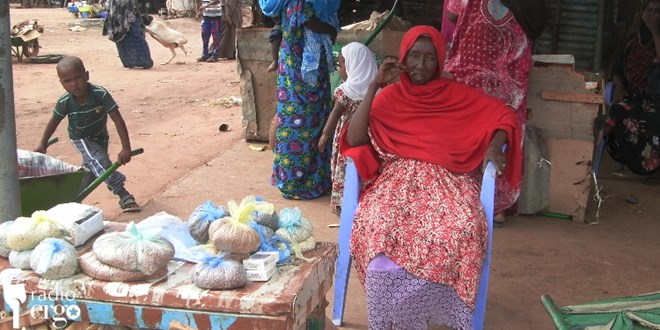
Friday April 14, 2023

Kawsar Jama sold off her livestock to set up a small business in Burao/Sadique Yusuf/Ergo
(ERGO) – Even at noon with the sun scorching, while most people have gone home as they are fasting for Ramadan, Maryan Osman still sits at her small food stall in Ina-Afmadobe, determined not to miss any customers.
She set up the stall in February in the urban centre after selling off 50 of her 70 goats, making $1,500 from their sale. Life as a pastoralist in the rural area in this part of Somaliland’s Togdher region had become too harsh and unpredictable with extreme weather conditions.
Maryan spent $400 setting up an iron-sheet house in Ina-Afmadobe, 65 kilometres from the city of Burao, and $200 settling her debts. She put the rest into her stall selling food and fresh produce.
“We were pastoralists, I once owned 200 goats and they used to over our needs, but as the drought became prolonged the number dropped to 70, and that is when I decided to sell them off,” Maryan told Radio Ergo.
She moved with 10 of her goats and left the other 10 behind for her relatives. She hopes to sell them too if they recover from the drought to use the money to expand her business.
Maryan pays $12 monthly rent for her stall, and on a good day is making $6 profit. She says she plans to put her five children in school.
“I don’t plan to return to the rural areas, I want to stay here so that my children can get an education. Business is slow but we prefer it here since there has been recurring drought in the rural areas,” she said.
She is happy to be providing three meals a day for her children instead of one or two they were getting previously.
Another mother of six, Kawsar Jama, migrated 95 kilometres from Shansha-Ade village to Burao to start a business. She owned 50 goats and sold off 35 of them, as the rest were below the market standards. She left the 15 feeble and sick goats behind in the village with her relatives.
She moved to the city in January and got a small place at her sister’s house where she sells her merchandise.
“I sold the goats at varying prices, some for $30 and others for $40. I got $1,400 in total from the sale of all of them. I used $1,000 for my business and used the rest to set up a simple house,” she said.
Kawsar stated that her life is changing for the better and she takes home $5 profit every day and hopes to put her children in school. Focused now on business, she does not plan to return to her village as she sees no hope or future there.
Another former Togdher pastoralist, Saleban Mohamed, decided to give up on his family’s long and proud tradition due to the changing climate that made livestock rearing hard.
He set up a small cafeteria selling food and drinks in Burao. He and his wife and eight children migrated from Shaleeli village, 85 kilometres away, towards the end of last year. He sold off 120 of his goats because the prolonged drought had been causing him great anxiety.
Saleban says is happy to be leading a more predictable life in town and enrolled six of his children in school at the beginning of this year.
There has been a rise in the number of people drifting away from pastoralism and turning to small business ventures in urban areas of Togdher region. However, not all pastoralists support their choices to quit livestock as a livelihood.
A Somali elder, Ali Abdi, who at the age of 75 has spent his whole life in livestock, said the migration to urban areas to do business would impede the productivity of people in rural areas. He warned that these are temporary and unsustainable solutions, believing that businesses can easily run into losses and provide no substitute for livestock.